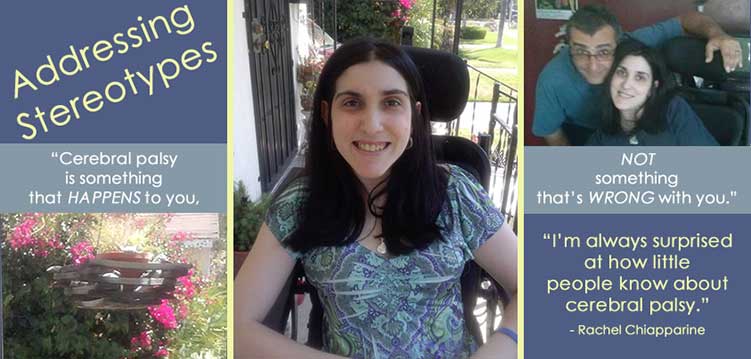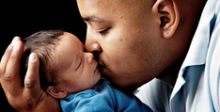Internal mini form
Contact Us Today

With grit and humor, woman beats back stereotypes
Californian Rachel Chiapparine is whip smart, engaging and loaded with perspectives. And she hopes her example shatters perceptions about people with Cerebral Palsy, and how they can demonstrate independence.
There’s something that Rachel Chiapparine wants people to know about Cerebral Palsy. It’s not something that’s genetic. People don’t pass it along to others, it’s most often the result of something that happens in the birthing process.
“I’m always surprised at how little people know about Cerebral Palsy,” said Rachel, who lives in Southgate, Calif., which is located about an hour outside of Los Angeles.
“People think it’s genetic; they think that there’s something wrong with you,” she said. “You have to explain to them that no, it’s not like that. It’s something that happens to you.”
For more than two decades, there has been an effort to protect the rights of people with disabilities. The Americans with Disabilities Act of 1990 brought sweeping changes to public facilities, limited the abilities of governments and private entities to practice discrimination, and put supports into place that have improved the level of inclusion for individuals with disabilities.
At a personal level, according to Rachel, people with disabilities are struggling with one central issue that colors all of their efforts. People just don’t understand what disability is, what it means to people who have a special need, or how to react to it. Sometimes, a lack of knowledge persists even among individuals that are there to help, Rachel said.
“People have automatically assumed that I wouldn’t do things that I ended up doing,” she said. “People said that I wouldn’t get married, and I did. And, I live as independently as I can.”
For Rachel, speaking out about her experiences is something she hopes gives a voice to people with disabilities that are struggling with pre-, or ill-conceived notions.
“I’m just like everyone else,” she said. “I’m not Rachel with Cerebral Palsy. I’m Rachel.”
Growing up Rachel
Rachel Chiapparine was born 27 years ago near Los Angeles and settled in Southgate, Calif. Her family includes an older sister and brother, Cindy and Nicky, and her father, Peter. The immediate family also included Rachel’s grandmother, Frances.
Born nearly three months premature, Rachel endured a brain bleed that resulted in spastic Cerebral Palsy. For mobility, she uses a wheelchair full-time. Rachel has use of both her arms, although she said her fine motor skills are more adept on her right side.
“My left side feels a little weaker,” she said.
Rachel said her childhood was mostly typical; she received a lot of support from her father and her grandmother, both of whom worked hard to see that she got everything she needed.
Often as a child, Rachel would read books – she is still an avid reader today – and plays video games. Playing the video games provided Rachel with a surprising benefit – it improved the dexterity of her hands and fingers, and her coordination.
“My father knew that I needed to have something that I could do physically that was fun,” she said. “They say the video games can help [a person’s hands], and they were right.”
Still, Rachel encountered some issues at school. In the classroom, Rachel felt that even though she has no cognitive impairment to speak of, her teachers tailored her lessons as if she did.
“At one point, I was told [by a teacher] that I would never learn my times tables,” she said. “A few years later, the teacher just assumed that I knew them. This created a lot of problems down the line, and I wasn’t given a chance to learn things everyone else was learning.”
Despite some setbacks, Rachel graduated from Warren High School in nearby Downey, Calif. She moved on to a local school to study interior design. She enrolled with the assurance from the school officials that she would be able to complete the coursework. But a week into the program, she learned that she would have to draw. When she explained that she could not work in that way, Rachel was told by administrators that she likely would not be able to complete the program.
This was a significant disappointment for the young student, but Rachel put it behind her.
“It’s hard to hear something like that,” she said. “But I got married shortly after that.”
A need-to-know basis
Rachel said that there are several aspects the public doesn’t understand about disability. People that have physical challenges are capable of making decisions for themselves. And, even if that person is a child, he or she is going to notice if they’re being treated differently than others.
“There are people that don’t want to have anything to do with helping you at all,” she said. “And then there are others who go completely overboard. I have yet to find the middle.”
One factor that has worked in Rachel’s favor is that her family has adequately planned for her future. She’s set to inherit the house from her beloved grandmother, which means that she will always have a place to live.
“I understand that I’m lucky, but parents can put some provisions into place,” she said. “Sometimes I’m not sure if they’re aware of those things.”
Rachel recalls a day when she met a 40-year-old gentleman. He had a disability, and when his mother died, he was placed in a home. “He didn’t have anything set up,” she said. “He lost his ability to care for himself, and his freedom went away.”
One piece of advice Rachel believes is helpful for everyone that lives with, or cares about, people with disabilities is to have a clear understanding of the laws of one’s state when it comes to disability benefits. This is important to both parents and children.
“People need to do a lot of research,” she said. “That means reading the fine print because the fine print can cause problems down the line.”
An independent life
Although Rachel does require some assistance in the home because she uses a wheelchair, she calls the shots in her own life.
Currently single, Rachel lives with her father to save money and to stay close to her family members. When the time comes that she does live alone, she feels more than prepared to take on the responsibility of hiring and managing personal care assistants to help her with daily tasks.
“The fact that I was allowed to go out and experience life, care for myself, and have new experiences has helped me,” she said. “It’s helped me come to terms [with her impairment]. I am normal, just like everyone else. Right now, I’m making it work.
“Life doesn’t stop for anyone,” Rachel said. “If you make a couple mistakes, it’s okay because everyone does that. What’s important is that people know they have options.”
A main component of feeling secure is to have the love and support from family.
“Other kids looked up to super heroes, I looked up to my brother and sister,” Rachel said. “They never treated me differently because of my chair. They love me even though I am years younger than them, and I look up to them both. They are both the type of person I want to be.”
One aspect of Rachel’s life that she enjoys is getting to be a “fun aunt” to a group of gregarious nieces and nephews who enjoy her company and are intrigued by her power chair.
In terms of the future, Rachel said she would like to go back to school, but only if she can find a course of study that will lead to meaningful employment. She isn’t interested in pursuing a degree just to have it.
“I’d love to have a job, but I really want to be able to get in there and work,” she said. “It’s something I’d really like to do. I don’t want my life to be defined by my disability.
“Right now, I’m seeing where my life takes me.”

As we grow and mature into adulthood we’re bound to have goals that may not seem to be attainable, or dreams we hope come true. While goals and dreams can be grandiose or simple depending on an individual’s personality and temperament, Cerebral Palsy is not an impediment to an exciting, and ultimately rewarding, life.
Adults with Cerebral Palsy
- Joe’l Ash – Overcoming Adversity
- Mike Berkson – Handicap This!
- Desaray Carroll – Receiving Recognition
- Rachel Chiapparine – Addressing Stereotypes
- Karen Lynn Chlup – Stretching Barriers
- Shevitta Collins – Accepting Outcomes
- Abbey Curran – Creating Confidence
- Robert Fayz – Funding Reductions
- Jon Gilroy – Transitioning to College
- Daniel Keplinger – Painting from Within
- Priscilla Morrison – Remembering Family
- Neil Sauter – Paying Forward








